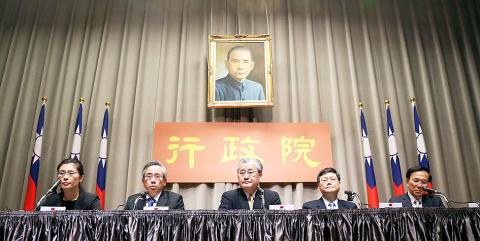President Ma Ying-jeou (馬英九) yesterday pledged to strengthen inspections on food and beverage manufacturers and severely punish those with problematic products amid a scare over adulturated cooking oils.
Presiding over the Chinese Nationalist Party’s (KMT) Central Standing Committee, Ma, who doubles as the party chairman, instructed the Ministry of Health and Welfare to hold a national food safety conference next month to address the issue.
“Food safety is a long-term issue, and the government will catch the bad manufacturers one by one and ensure food safety in Taiwan,” he said following the ministry’s report on the latest food safety scandal in which a major cooking oil company was found adulturating and mislabeling its oils.

Photo: CNA
As of Tuesday, the Chang Chi Foodstuff Factory Co had been fined NT$28.6 million (US$972,700) earlier this month, in accordance with the Act Governing Food Sanitation (食品衛生管理法), after authorities found that its products had been adulterated.
Suspicious consumers had questioned the quality of the firm’s cooking oil and tips from whistle-blowers in the company helped break the story.
Ma defended the government’s efforts to address food safety issues that have emerged in recent years, from plasticizers and toxic starch to the problematic cooking oils, and promised to increase manpower and budgets to enhance food safety.
“The problems have been there for a while, but they began to emerge only in recent years… It gives us a chance to examine the long-existing issues and resolve them,” he said.
Separately yesterday, Minister of Health and Welfare Chiu Wen-ta (邱文達), in response to repeated media enquiries on whether he would take political responsibility for alleged negligence in the food inspection process, said he “takes full responsibility for cracking down on ‘black-hearted’ food suppliers.”
“No matter when [the incidents] happened, [even] if it was my predecessor in the office, I will take full responsibility,” he said.
Meanwhile, Vice Minister of Economic Affairs Woody Duh (杜紫軍) said he disagreed with lawmakers who called for the Good Manufacturing Practice (GMP) certification — the government-backed label — be abolished on ground that the Chang Chi incident has proved the accreditation systems had been discredited.
Chang Chi was able to receive 17 GMP certifications for its edible oil products because it provided the Industrial Development Bureau with “misinformation about its manufacturing processes” to obtain the certificates, Duh said.
To address the loophole and others, the bureau is reviewing the GMP system and might require a manufacturer to present its import-export invoices and declarations and to allow on-the-spot inspection of its production lines when it seeks certification, Duh said.
The ministry will ensure that GMP is a guarantee for safety, Duh said, adding that “without the GMP system, consumers would be more exposed to unsafe foods.”
Duh said the ministry would complete ingredient testing of all 20 edible oil products advertised as 100 percent natural and unadulterated in two days and of all 129 blended cooking oil products within one week to ensure that products on the market are safe.
People who have information about suspicious food products can (02) 2325-0955, Duh said.

A preclearance service to facilitate entry for people traveling to select airports in Japan would be available from Thursday next week to Feb. 25 at Taiwan Taoyuan International Airport, Taoyuan International Airport Corp (TIAC) said on Tuesday. The service was first made available to Taiwanese travelers throughout the winter vacation of 2024 and during the Lunar New Year holiday. In addition to flights to the Japanese cities of Hakodate, Asahikawa, Akita, Sendai, Niigata, Okayama, Takamatsu, Kumamoto and Kagoshima, the service would be available to travelers to Kobe and Oita. The service can be accessed by passengers of 15 flight routes operated by

Alain Robert, known as the "French Spider-Man," praised Alex Honnold as exceptionally well-prepared after the US climber completed a free solo ascent of Taipei 101 yesterday. Robert said Honnold's ascent of the 508m-tall skyscraper in just more than one-and-a-half hours without using safety ropes or equipment was a remarkable achievement. "This is my life," he said in an interview conducted in French, adding that he liked the feeling of being "on the edge of danger." The 63-year-old Frenchman climbed Taipei 101 using ropes in December 2004, taking about four hours to reach the top. On a one-to-10 scale of difficulty, Robert said Taipei 101

Taiwanese and US defense groups are collaborating to introduce deployable, semi-autonomous manufacturing systems for drones and components in a boost to the nation’s supply chain resilience. Taiwan’s G-Tech Optroelectronics Corp subsidiary GTOC and the US’ Aerkomm Inc on Friday announced an agreement with fellow US-based Firestorm Lab to adopt the latter’s xCell, a technology featuring 3D printers fitted in 6.1m container units. The systems enable aerial platforms and parts to be produced in high volumes from dispersed nodes capable of rapid redeployment, to minimize the risk of enemy strikes and to meet field requirements, they said. Firestorm chief technology officer Ian Muceus said

MORE FALL: An investigation into one of Xi’s key cronies, part of a broader ‘anti-corruption’ drive, indicates that he might have a deep distrust in the military, an expert said China’s latest military purge underscores systemic risks in its shift from collective leadership to sole rule under Chinese President Xi Jinping (習近平), and could disrupt its chain of command and military capabilities, a national security official said yesterday. If decisionmaking within the Chinese Communist Party has become “irrational” under one-man rule, the Taiwan Strait and the regional situation must be approached with extreme caution, given unforeseen risks, they added. The anonymous official made the remarks as China’s Central Military Commission Vice Chairman Zhang Youxia (張又俠) and Joint Staff Department Chief of Staff Liu Zhenli (劉振立) were reportedly being investigated for suspected “serious